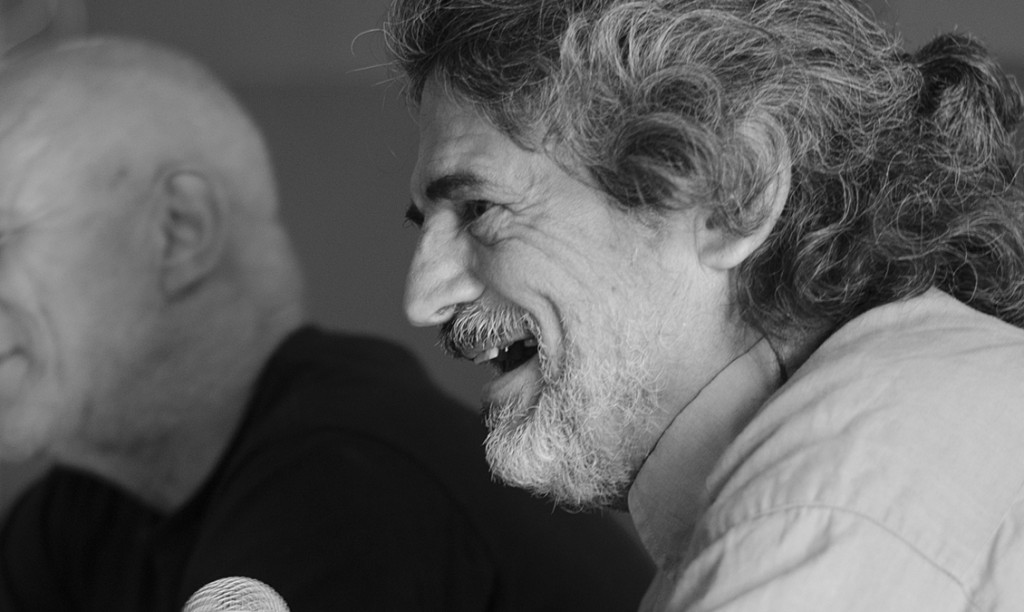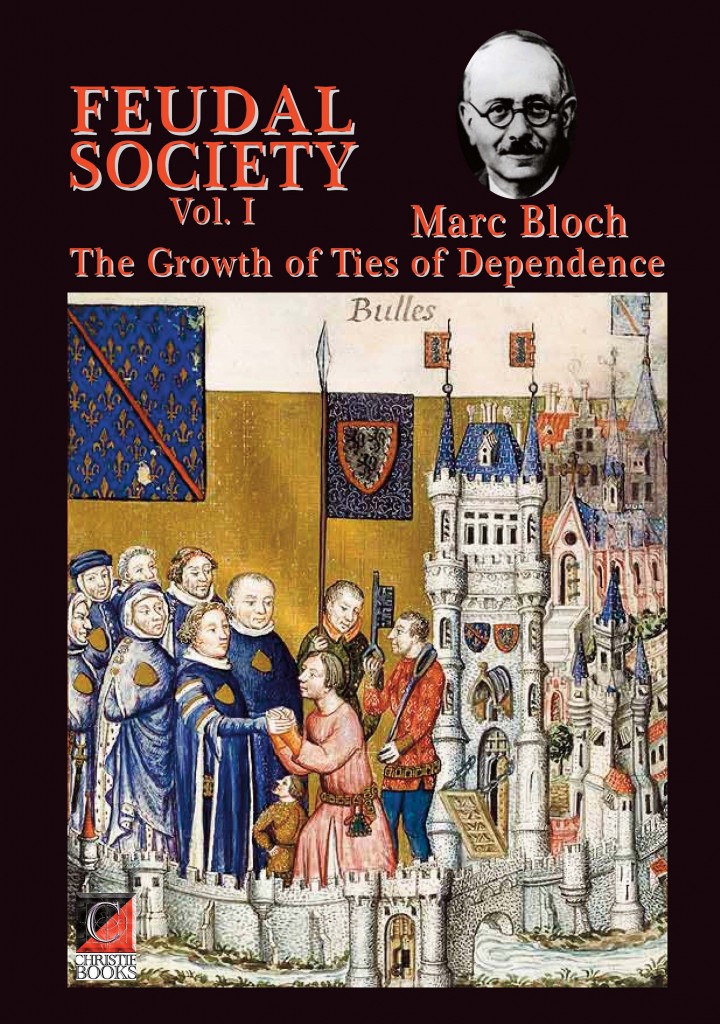 Feudal Society (£1.50 — eBookshelf) is a great work of historical synthesis in the finest French tradition. The author treats feudalism as a living and vitalising force in the society of Western Europe from the ninth to the thirteenth century. After surveying the social and intellectual conditions in which feudalism developed, Bloch examines the nature of the bond of kinship both as a predecessor and as a concomitant of vassalage. The core of the book is a masterly account of the creation of ties of dependence and of relations of lord and vassal, and the origins and nature of the fief. The nobility and their way of life, knighthood and chivalry, the clergy and other forces in society are also portrayed, and the work concludes with a discussion on feudalism as a type of society. Throughout the author treats history as a living organism and endless process of creative evolution. “Here is one of those rare books of impeccable scholarship (superbly translated by Mr Manyon) which no intelligent person could possibly read without pleasure and interest and excitement. What Bloch’s book gives us is the anatomy of an age. Some would call it sociology rather than history, or at any rate historical sociology. If so, it adds a new dimension which most historical writing lacks.”—GEOFFREY BARRACLOUGH, The Observer
Feudal Society (£1.50 — eBookshelf) is a great work of historical synthesis in the finest French tradition. The author treats feudalism as a living and vitalising force in the society of Western Europe from the ninth to the thirteenth century. After surveying the social and intellectual conditions in which feudalism developed, Bloch examines the nature of the bond of kinship both as a predecessor and as a concomitant of vassalage. The core of the book is a masterly account of the creation of ties of dependence and of relations of lord and vassal, and the origins and nature of the fief. The nobility and their way of life, knighthood and chivalry, the clergy and other forces in society are also portrayed, and the work concludes with a discussion on feudalism as a type of society. Throughout the author treats history as a living organism and endless process of creative evolution. “Here is one of those rare books of impeccable scholarship (superbly translated by Mr Manyon) which no intelligent person could possibly read without pleasure and interest and excitement. What Bloch’s book gives us is the anatomy of an age. Some would call it sociology rather than history, or at any rate historical sociology. If so, it adds a new dimension which most historical writing lacks.”—GEOFFREY BARRACLOUGH, The Observer
COMMON SENSE ADDRESSED TO THE INHABITANTS OF AMERICA by THOMAS PAINE. eBook £1.00
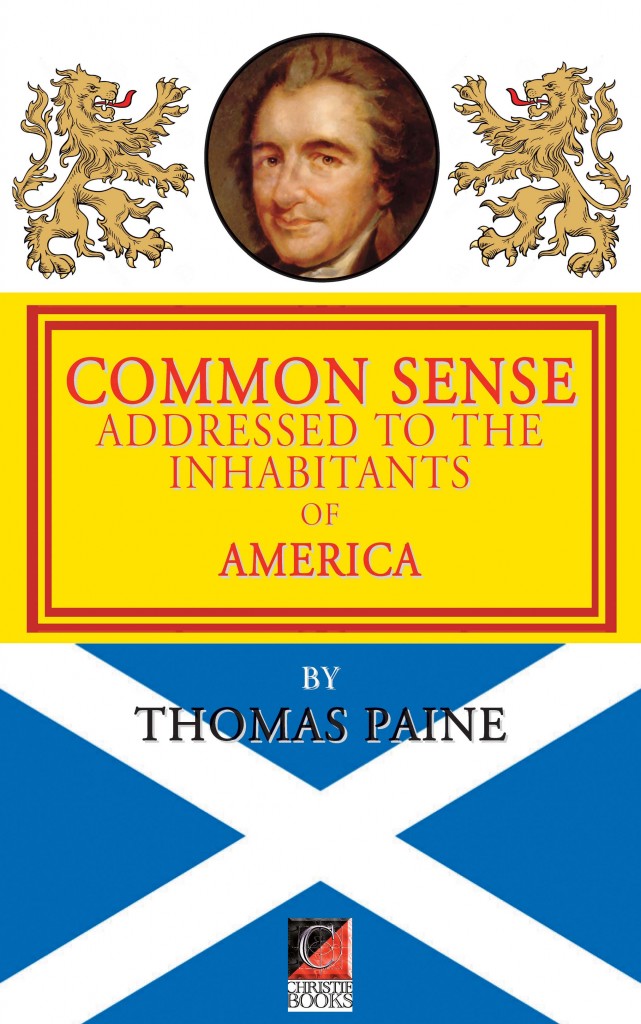 In Common Sense, (eBOOKSHELF) Thomas Paine argues eloquently for American independence from autocratic rule from London Whitehall, an argument that begins with more general, theoretical reflections about government and religion, then progresses onto the specifics of the colonial situation. It is also an argument that has some bearing on the current ongoing movement for Scottish (as well as Catalan and Basque…) independence.
In Common Sense, (eBOOKSHELF) Thomas Paine argues eloquently for American independence from autocratic rule from London Whitehall, an argument that begins with more general, theoretical reflections about government and religion, then progresses onto the specifics of the colonial situation. It is also an argument that has some bearing on the current ongoing movement for Scottish (as well as Catalan and Basque…) independence.
Distinguishing between government and society, Paine argues that the latter is all that is constructive and good that people join together to accomplish. Government, on the other hand, is an institution whose sole purpose is to protect us from our own vices. Government has its origins in the evil of man and is therefore a necessary evil at best. The sole purpose of government, he says, is to protect life, liberty and property, and that a government should be judged solely on the extent to which it accomplishes that goal.
TOMAS ORTS MARTIN (1908 – ??) A profile by Agustín Guillamón (Translated by Paul Sharkey)
 Tomàs Orts Martin was born in Barcelona on 5 December 1908 A Catalan speaker, he worked for two years in Jesús García’s umbrella factory at 7 Calle Villaroel before moving on to Bartolomé Español at 7 Calle Salvador where he joined the CNT union on 1 February 1930, and subsequently held various posts with the Local Federation of Trade Unions.
Tomàs Orts Martin was born in Barcelona on 5 December 1908 A Catalan speaker, he worked for two years in Jesús García’s umbrella factory at 7 Calle Villaroel before moving on to Bartolomé Español at 7 Calle Salvador where he joined the CNT union on 1 February 1930, and subsequently held various posts with the Local Federation of Trade Unions.
During the street-fighting of 19-20 July 1936 Tomàs fought on the Paralelo, the University, Atarazanas barracks and elsewhere alongside Manuel Hernández (president of the Timberworkers’ Union), Eugenio Vallejo (the metalworker who spearheaded the conversion of Catalonia’s industry into war industries) and Liberto Minue (brother-in-law to Manuel Escorza, secretary of the CNT-FAI Investigation and Information Service).
EL ECO DE LOS PASOS. Juan García Oliver. El anarcosindicalismo en la calle, en el Comité de Milicias, en el gobierno, en el exilio.(/strong> eBook, £1.50/€2.00/$2.50
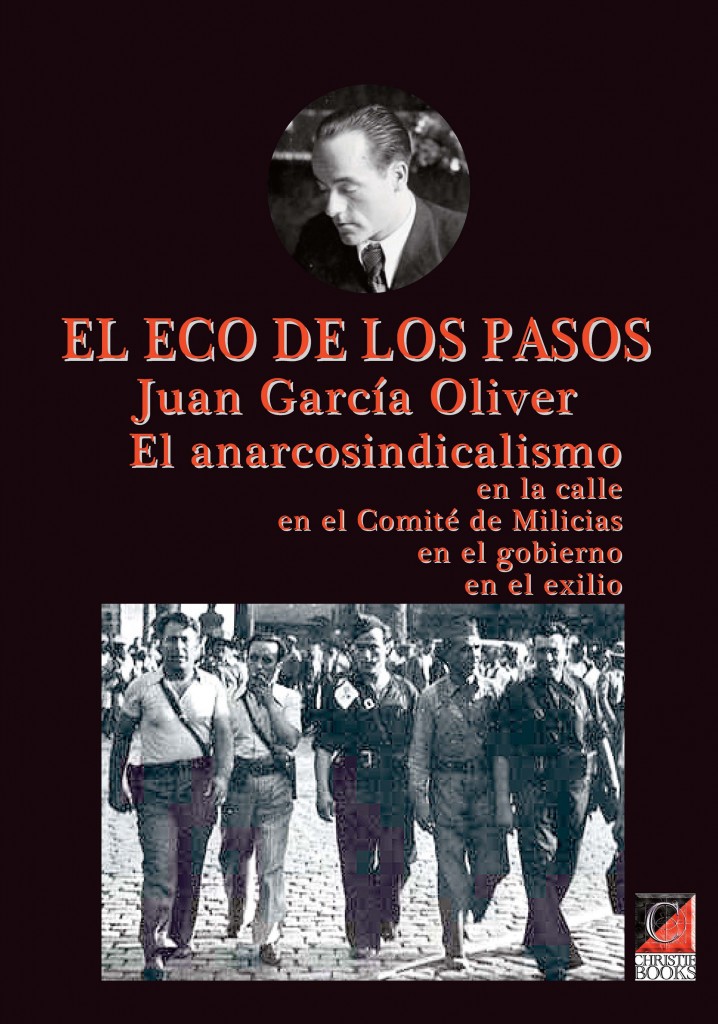 EL ECO DE LOS PASOS. Juan García Oliver. El anarcosindicalismo en la calle, en el Comité de Milicias, en el gobierno, en el exilio. eBook — £1.50/€2.00/$2.50 direct from the CB eBookshelf
EL ECO DE LOS PASOS. Juan García Oliver. El anarcosindicalismo en la calle, en el Comité de Milicias, en el gobierno, en el exilio. eBook — £1.50/€2.00/$2.50 direct from the CB eBookshelf
KINDLE MARKETS: UK : £3.51 ; USA : $5.00 ; FRANCE : €4.63 ; GERMANY : €4.63 ; SPAIN : €4.63 ; ITALY: €4.63 ; NETHERLANDS : €4.63 ; JAPAN : ¥ 594 ; CANADA : CDN $7.06 ; BRAZIL : R$ 20.47 ; AUSTRALIA : $7.14 ; INDIA : R338 ; Mexico : $92.21 — KOBO : EL ECO DE LOS PASOS: EL ANARCOSINDICALISMO En la calle En el Comité de Milicias En el gobierno En el exilio by Juan García Oliver. £10.00
La autobiografía extraordinaria de Juan García Oliver, escrita a sus 71 años desde el exilio en México y publicada originalmente por Ruedo Ibérico. En ella se narran, con prosa ágil y hasta frenética en este extraordinario testimonio, los acontecimientos de su extraordinaria vida, desde sus precoces actividades sindicales, participaciones en huelgas y encarcelaciones, hasta su nombramiento como Ministro de Justicia y su doloroso periplo de exiliado por medio mundo.
Tras muchos años de silencio y de huir de todo tipo de protagonismo histórico, desde su exilio mexicano Juan García Oliver da a la publicidad sus Memorias. Anarcosindicalista de la primera hora, hombre bregado en huelgas y luchas revolucionarias, este antiguo camarero, huésped asiduo de los más duros penales de la dictadura primorriverista, había de convertirse en una de las figuras políticas claves del bando republicano. Su intervención resultó decisiva para la continuidad de la legalidad republiblicana en Catalunya tras la derrota de las fuerzas insurrectas y más tarde, siendo ya ministro de Justicia, había de convertirse en hombre-puente a quien confiar el allanamiento y suavización de los antagonismos que enfrentaban a las fuerzas en el seno de la República.
De sí mismo, Juan García Oliver ha dicho: “Mi muerte será gris y posiblemente llegue con demasiado retraso.” Más de medio siglo de actividad militante hacen imposible una biografía sucinta, a la manera clásica, que mar- que los hitos más importantes de su vida. Lo importante en García Oliver es el hilo conductor, la coherencia íntima de sus actos.
A modo de introducción
Este no será un libro completo. Tampoco será una obra lograda. Sobre la CNT -CNT igual a anarcosindicalismo- se ha escrito bastante. Y se ha escrito por haberse revelado como la única fuerza capaz de hacer frente a los militares españoles sublevados contra el pueblo. Fue la CNT -los anarcosindicalistas- la que impidió, por primera vez en la historia, que un ejército de casta se apoderase de una nación mediante el golpe de Estado militar. Hasta entonces, y aún después, nadie se opuso a los militares cuando en la calle y al frente de sus soldados asestaban a su pueblo un golpe de Estado. La sublevación de julio de 1936 era de carácter fascista y al fascismo europeo, en la calle y frente a frente, ningún partido ni organización había osado enfrentarlo. La CNT -los anarcosindicalistas- no logró hacer escuela en las formaciones proletarias del mundo entero. Otros golpes de Estado han sido realizados después por militares. El de Chile, por ejemplo, frente a casi los mismos componentes que en España -socialistas, comunistas, marxistas-, pero sin anarcosindicalistas, fue para los militares un paseo. Tal como se está explicando lo ocurrido en Chile, la lección para los trabajadores será nula. Porque no fueron los militares quienes mataron a Allende, sino la soledad en que lo dejaron. Algo muy parecido le ocurrió al presidente de la Generalidad de Cataluña, Luis Companys, en el movimiento de octubre de 1934. Entonces, como ahora, predominaba en Europa una manifestación del comunismo, gritón, llorón, dado a difamar a cuantos no se doblegan al peso de sus consignas. Bueno, sí, para organizar desfiles aparatosos en Madrid, en Barcelona, en Santiago, en Berlín. Pero, al trepar al poder Hitler en Alemania, solamente el anarquista individualista holandés Van der Lubbe tuvo el arranque de pegarle fuego al Parlamento, desafiando las iras de quien se creía más poderoso que los dioses. Aquel fuego purificador alumbró la sordidez del mundo comunista, pagado de sus periódicos, de sus desfiles, de sus manifestaciones, pero que, carente de la chispa insurreccional de los anarcos, siempre dejó libre el paso a los enemigos de la libertad. No amando la libertad, no son aptos para defenderla.
La CNT tuvo excelentes luchadores, hombres y mujeres capaces de llenar páginas de Historia. Pero careció de intelectuales capaces de describir y de teorizar nuestras gestas.
Durante años he vivido en la duda de si debía eternizarse nuestras luchas en narraciones veraces. El final de Allende, asesinado por la soledad en que lo dejaron sus partidarios, me ha convencido de que convenía que el mundo obrero conociera lo que éramos colectivamente, y no solamente a través de la imagen de un hombre y de un nombre. La CNT dio vida a muchos héroes. En la medida de lo posible deben irse aportando ya los materiales de la verdadera historia del anarcosindicalismo en su aspecto humano, más importante que las manifestaciones burocráticas, que tanto se han prodigado. Solamente la veracidad puede dar la verdadera dimensión de lo que fuimos.
La verdad, la bella verdad, sólo puede ser apreciada si, junto a ella, como parte de ella misma, está también la fea cara de la verdad. — Juan García Oliver
MY REVOLUTIONARY LIFE JUAN GARCÍA OLIVER Interviewed by FREDDY GÓMEZ Translated by PAUL SHARKEY. Interview conducted in Paris on 29 June 1977 (eBook £1.00. Print copy also available from Kate Sharpley Library)
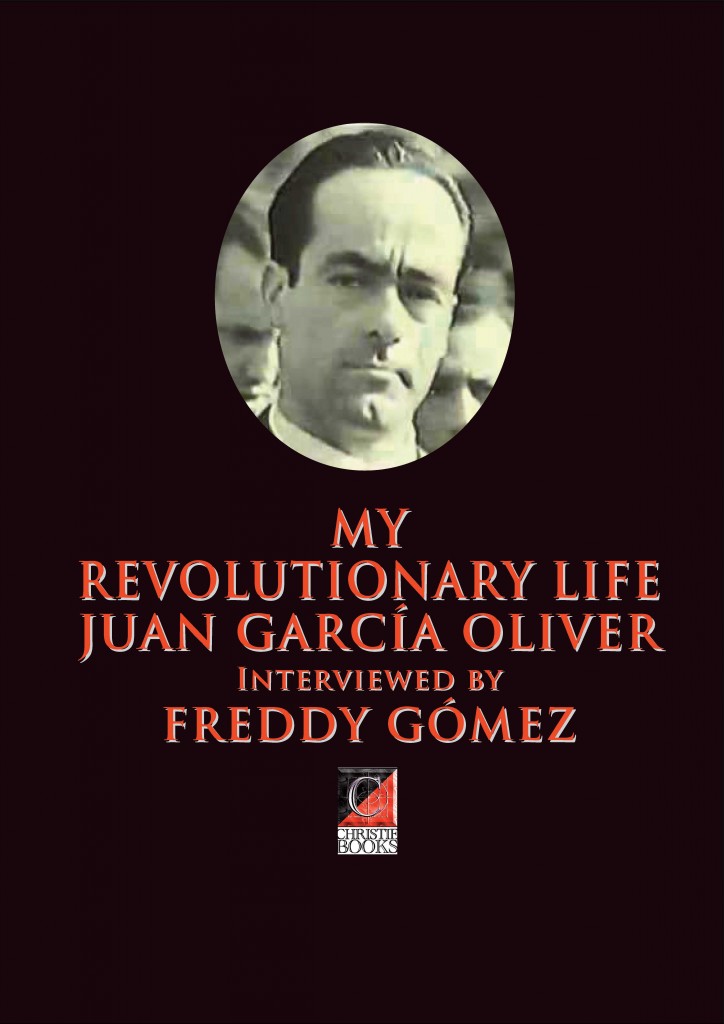 Juan García Oliver (1901-1980) was an anarcho-syndicalist CNT militant who played a key role in the Spanish anarchist movement from 1917 through to the end of the Spanish Civil War. When the military moved out of their barracks on 18 July 1936 he, along with Durruti, Ascaso, and other members of the ‘Nosotros’ Group, the core of the Regional CNT Defence Committee of Catalonia (the co-ordinating body of the Catalan workers’ resistance), were prepared and ready for them. From 21 July onward, following the workers’ defeat of the attempted fascist coup d’état, Oliver became a central political figure in subsequent events, first as secretary of the Militias Committee then Minister of Justice in the Madrid government of Largo Caballero. This interview with García Oliver by anarchist historian and journalist Freddy Gómez, made in Paris in June 1977, benefits enormously from Oliver’s hindsight, probably the only one of the ‘official’ CNT-FAI leadership (Federica Montseny, Germinal Esgleas, ‘Marianet’, Horacio Prieto, Diego Abad de Santillan, Fidel Miró, Francisco Isgleas, Serafín Aliaga, none of whom were activists!) with any degree of integrity.
Juan García Oliver (1901-1980) was an anarcho-syndicalist CNT militant who played a key role in the Spanish anarchist movement from 1917 through to the end of the Spanish Civil War. When the military moved out of their barracks on 18 July 1936 he, along with Durruti, Ascaso, and other members of the ‘Nosotros’ Group, the core of the Regional CNT Defence Committee of Catalonia (the co-ordinating body of the Catalan workers’ resistance), were prepared and ready for them. From 21 July onward, following the workers’ defeat of the attempted fascist coup d’état, Oliver became a central political figure in subsequent events, first as secretary of the Militias Committee then Minister of Justice in the Madrid government of Largo Caballero. This interview with García Oliver by anarchist historian and journalist Freddy Gómez, made in Paris in June 1977, benefits enormously from Oliver’s hindsight, probably the only one of the ‘official’ CNT-FAI leadership (Federica Montseny, Germinal Esgleas, ‘Marianet’, Horacio Prieto, Diego Abad de Santillan, Fidel Miró, Francisco Isgleas, Serafín Aliaga, none of whom were activists!) with any degree of integrity.
The eBook is available as a Mobi file from the CB eBookshelf at £1.00. An ePub file is also available (email) (Also available from both Kindle and Kobo)
A print copy is available here from the Kate Sharpley Library.
García Oliver addressing a public meeting of the CNT-AIT in Valencia (1936)
 RANDOLPH SILLIMAN BOURNE, born 1886 Bloomfield, New Jersey, died aged 32 during an influenza epidemic on 23 December 1918. A radical social critic who sympathised with the Industrial Workers of the World (IWW), his literary career lasted less than ten years yet the integrity and commitment, which shines through in his articles and essays in the dramatic period before and during World War One, sets him apart from other intellectuals of his time. He left behind a legacy of astonishingly mature and incisive writings on politics, literature, and culture, which were of enormous influence in shaping the American intellectual climate of the 1920s and 1930s. This collection includes such noted essays as “The War and the Intellectuals,” “The State,” “What is Exploitation,” “Law and Order,” “Trans-National America,” “Below the Battle,” and “Twilight of the Idols.” Bourne’s critique of militarism and advocacy of cultural pluralism are enduring contributions to social and political thought that has an equally strong impact today. In his introduction to The Radical Will: Randolph Bourne Selected Writings 1911-1918 (Urizen Books, 1977) his editor, Olaf Hansen, summed up Bourne’s legacy: ‘Bourne’s quest for a rational community had this significance. He wanted to be a citizen of the world without giving up his vision of how much better a place it might be. His contribution to the attainment of such hopes was a radical analysis of the world’s shortcomings.’
RANDOLPH SILLIMAN BOURNE, born 1886 Bloomfield, New Jersey, died aged 32 during an influenza epidemic on 23 December 1918. A radical social critic who sympathised with the Industrial Workers of the World (IWW), his literary career lasted less than ten years yet the integrity and commitment, which shines through in his articles and essays in the dramatic period before and during World War One, sets him apart from other intellectuals of his time. He left behind a legacy of astonishingly mature and incisive writings on politics, literature, and culture, which were of enormous influence in shaping the American intellectual climate of the 1920s and 1930s. This collection includes such noted essays as “The War and the Intellectuals,” “The State,” “What is Exploitation,” “Law and Order,” “Trans-National America,” “Below the Battle,” and “Twilight of the Idols.” Bourne’s critique of militarism and advocacy of cultural pluralism are enduring contributions to social and political thought that has an equally strong impact today. In his introduction to The Radical Will: Randolph Bourne Selected Writings 1911-1918 (Urizen Books, 1977) his editor, Olaf Hansen, summed up Bourne’s legacy: ‘Bourne’s quest for a rational community had this significance. He wanted to be a citizen of the world without giving up his vision of how much better a place it might be. His contribution to the attainment of such hopes was a radical analysis of the world’s shortcomings.’
A century later Bourne’s final essay, ‘The State’, reproduced here, retains the resonance it had in 1918 — a lucid analysis of how states and governments manipulate and induce the patriotic hysteria that precedes declarations of war and ‘states of emergency’ to suit their own political and corporate ends.
Available for download (as a Mobi file) on the ChristieBooks eBookshelf for £1.50 Email if you require an ePub file. (See inside)
ROGUE AGENTS. The Cercle and the 6I in the Private Cold War 1951 – 1991 David Teacher( eBook £1.50) NEW FULLY REVISED EDITION (December 2015)

The early Catholic influence on movements for European integration can be seen in the flag of today’s European Union; the design of a circle of stars on a field of blue was derived from the halo of twelve stars crowning the Virgin Mary in Catholic (Paneuropean Union –PEU) iconography. Arsène Heitz, the designer of the flag adopted in 1955, said that “the flag of Europe is the flag of Our Lady”. The symbol surrounded by stars is the seal of Charlemagne (as used by the Académie Européenne des Sciences Politiques (AESP).
ROGUE AGENTS. The Cercle and the 6I in the Private Cold War 1951 – 1991 (ISBN 978-1-873976-01-2), David Teacher. First published in 1993. This fully revised eBook (Kindle) (4th and final edition) published December 2015 by ChristieBooks. The full text of the fourth and final edition (6.7MB) can be downloaded (free) HERE
“David Teacher has been researching notorious disformationist Brian Crozier and his various allies since 1988, producing the first edition of Rogue Agents in 2008. Since then, the book has been expanded twice: once in 2011 to include later research and scans of the numerous internal documents used in its preparation (40 MB download), and in 2015 to integrate newly declassified sources (State Department cables, records of Kissinger’s phone-calls, private papers of Cercle participants) and recent academic publications. This final edition of a now-classic work of investigation documents the role played by the Cercle Pinay and Crozier’s private intelligence service, the 6I, in supporting Franco, White South Africa, Rhodesia, Thatcher, Reagan and Strauss, and denigrating progressive politicians and forces such as Wilson, Brandt, Carter, Mitterrand and the pro-disarmament movement of the 1980s. The new eBook edition is now available for download on the ChristieBooks eBookshelf for £1.50
POLITICAL PARTIES. A Sociological Study of the Oligarchical Tendencies of Modern Democracies by Robert Michels
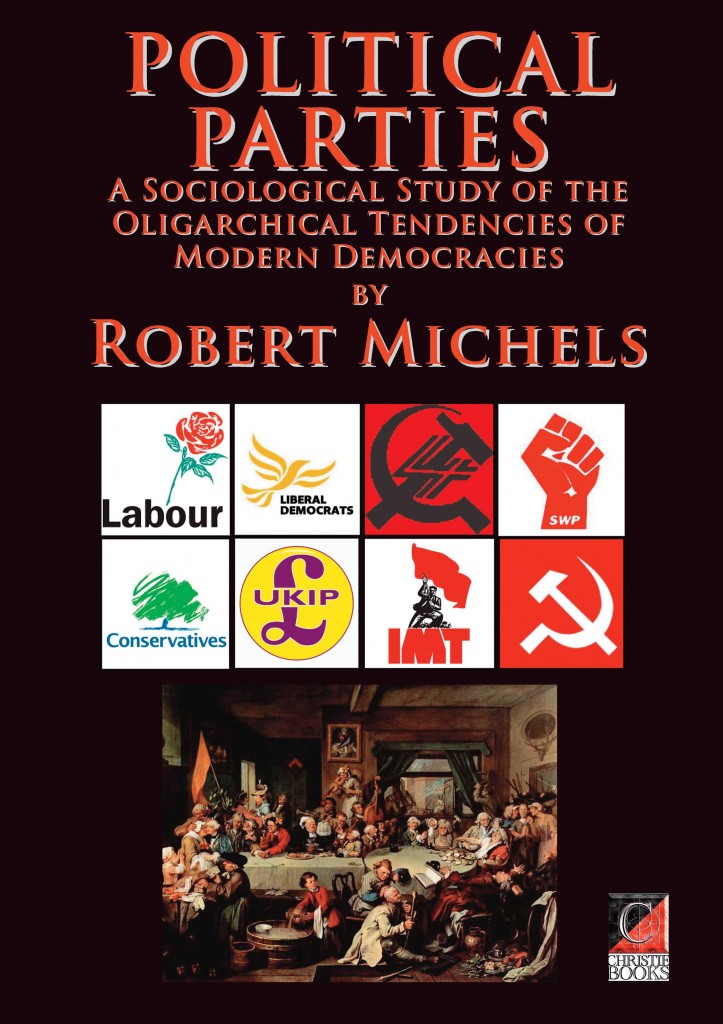 First published in German in 1911, Robert Michels’ ‘Political Parties’ is a classic of political and social science; it analyses the evolution of oligarchical power structures within political parties and trade unions, particularly those, ostensibly, most committed to egalitarian and democratic ideals — socialist parties, organisations and trade unions — including anarcho-syndicalist labour unions. Clearly and succinctly the libertarian syndicalist (at the time) Michels explains the emergence of elites and the process and dynamic by which radical parties lose sight of their radical objectives within representative parliamentary and electoral systems. His starting point is the hypothesis that in organizations committed to the realization of democratic values there inevitably arise strong oligarchic tendencies, which present a serious if not insuperable obstacle to the realization of those values. “It is organization which gives birth to the domination of the elected over the electors, of the mandatories over the mandators, of the delegates over the delegators. Who says organization says oligarchy”. Thus Michels summed up his famous “iron law of oligarchy.”
First published in German in 1911, Robert Michels’ ‘Political Parties’ is a classic of political and social science; it analyses the evolution of oligarchical power structures within political parties and trade unions, particularly those, ostensibly, most committed to egalitarian and democratic ideals — socialist parties, organisations and trade unions — including anarcho-syndicalist labour unions. Clearly and succinctly the libertarian syndicalist (at the time) Michels explains the emergence of elites and the process and dynamic by which radical parties lose sight of their radical objectives within representative parliamentary and electoral systems. His starting point is the hypothesis that in organizations committed to the realization of democratic values there inevitably arise strong oligarchic tendencies, which present a serious if not insuperable obstacle to the realization of those values. “It is organization which gives birth to the domination of the elected over the electors, of the mandatories over the mandators, of the delegates over the delegators. Who says organization says oligarchy”. Thus Michels summed up his famous “iron law of oligarchy.”
NB! For eBook compatible files (Mobi/ePub) send £1.50 by Paypal to christie@btclick.com or order direct from the ChristieBoooks eBOOKSHELF
DURRUTI — LETTER FROM PRISON (El Puerto de Santa María, Cadiz) 1933 Agustín Guillamón (Translated by Paul Sharkey)
 On Sunday 2 April 1933, Durruti, Ascaso and ‘Combina’ were arrested leaving the Andalusian-Extremaduran Regional Congress in Seville charged with promulgating the ‘criminal’ ideas discussed during the closing session.” [1] This was blatant ‘thought crime’ and flew in face of the Second Republic’s much vaunted right to freedom of expression. On Sunday 9 April, the representative leaders from Estat Catalá and the ERC (Republican Left of Catalonia) gathered in Barcelona to pay tribute to the fascist Josep Dencás (the Minister of Health at the time); they believed the Seville arrests had decapitated the FAI and that that organisation could now be considered a spent force. Such declarations amounted to wishful thinking, commonplace among those directing the bourgeois machinery of repression when they set out to resolve complicated and deep-seated social issues and concomitant bitter and run-of-the-mill terrorist and public order implications by reducing the issues to a few individual leaders and scapegoats. Josep Dencás was one of the founders, prime movers – along with the Badía brothers – and sponsors of the fascistic, pro-independence escamots of the JEREC (Republican Left Youth-Estat Catalá).
On Sunday 2 April 1933, Durruti, Ascaso and ‘Combina’ were arrested leaving the Andalusian-Extremaduran Regional Congress in Seville charged with promulgating the ‘criminal’ ideas discussed during the closing session.” [1] This was blatant ‘thought crime’ and flew in face of the Second Republic’s much vaunted right to freedom of expression. On Sunday 9 April, the representative leaders from Estat Catalá and the ERC (Republican Left of Catalonia) gathered in Barcelona to pay tribute to the fascist Josep Dencás (the Minister of Health at the time); they believed the Seville arrests had decapitated the FAI and that that organisation could now be considered a spent force. Such declarations amounted to wishful thinking, commonplace among those directing the bourgeois machinery of repression when they set out to resolve complicated and deep-seated social issues and concomitant bitter and run-of-the-mill terrorist and public order implications by reducing the issues to a few individual leaders and scapegoats. Josep Dencás was one of the founders, prime movers – along with the Badía brothers – and sponsors of the fascistic, pro-independence escamots of the JEREC (Republican Left Youth-Estat Catalá).
A profile of Txema Bofill (1953-2015), aka ‘Sabata’. From Grupos Autónomos: una crónica armada de la transición democrática by Joni D. (El Lokal, Barcelona, 2014) pp. 60-69 — Translated by Paul Sharkey
Sabata (from sabata, the Catalan word for shoe) decided as a child he was intended for the priesthood and was entered into a seminary, which he later left, unable to live up to the vow of celibacy. Born in 1953, this restless child of a bourgeois Catalan Catholic family from La Bisbal was captivated by the charismatic personality of a local priest and decided to follow in his footsteps, despite his father’s misgivings, who believed that at the age of nine he did not know enough to make such a monumental decision. The village priest, a dynamic character, impressed Sabata, as did Catalanism and the sense of brotherhood. He also discovered repression at first hand at this time: camping near the border they were surrounded one night by Civil Guard troops; on another occasion, during a night-time crossing, a cheeky retort to a challenge from two police officers earned him a slap in the face. His ‘radicalisation began in the seminary, as he graduated from child to adolescent in the company of worker priests, followers of Liberation Theology and reading banned books from France. Most people in the border area had relatives in France and the proximity of the frontier made contact that much easier.





